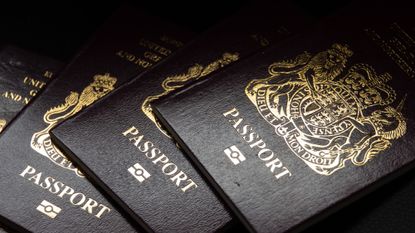'Orwellian nightmare’: passport database to be used to catch thieves
Policing minister wants to use personal data to crack down on shoplifting crime wave

A free daily digest of the biggest news stories of the day - and the best features from our website
Thank you for signing up to TheWeek. You will receive a verification email shortly.
There was a problem. Please refresh the page and try again.
Britain's passport database could be used to catch shoplifters, burglars and other criminals under plans currently being considered by the policing minister.
Chris Philp said he wanted to integrate information from national databases including the Passport Office and the Police National Database (PND) to "help police find a match with the 'click of one button'", The Guardian reported.
During a fringe event at the Conservative Party conference in Manchester, Philp said he was asking police to search the passport database now, but plans to roll out a new data platform in "the next two years".
Subscribe to The Week
Escape your echo chamber. Get the facts behind the news, plus analysis from multiple perspectives.

Sign up for The Week's Free Newsletters
From our morning news briefing to a weekly Good News Newsletter, get the best of The Week delivered directly to your inbox.
From our morning news briefing to a weekly Good News Newsletter, get the best of The Week delivered directly to your inbox.
The proposal has sparked controversy from both politicians and privacy campaigners.
'Zero-tolerance approach'
Police forces currently "only run facial recognition software through the PND", said The Times, but it "only holds information on people who have been arrested".
Although access is permitted to the passport database, it is not currently being used to search for criminals as it "sits on a completely separate IT system", the newspaper added.
The number of people who hold a UK passport "increased to 45.7 million" in 2021, said the Daily Mirror, citing the most recent census. It is this data that would be drawn upon to help police catch criminals.
Philp wants the police to "start running footage of crime scenes through the separate passport system", The Times stated. He is determined to avoid an American-style situation where some stores have felt forced to leave parts of cities due to high levels of crime.
Consequently, the new scheme is likely to form part of a wider "zero tolerance approach" by police chiefs, who will investigate any crime with a "reasonable line of inquiry", said The Telegraph.
It will give police powers to search facial images from various places including mobile phone or doorbell cameras as well as CCTV.
'Gross violation'
Resistance to the creation of a mass facial recognition system has been widespread.
"Philp's plan to subvert Brits' passport photos into a giant police database is Orwellian and a gross violation of British privacy principles," Silkie Carlo, director of campaign group Big Brother Watch, told the Mirror.
Carlo suggested the "highly inaccurate facial recognition technology" would make Britons into "suspects" and overlook "the real reasons for shoplifting".
Alistair Carmichael, home affairs spokesperson for the Liberal Democrats, also said the party would oppose the proposals "every step of the way".
Unprecedented shoplifting
But while the plans have been criticised, some suggest a major crackdown on crime is the only way to solve a growing shoplifting problem.
Last year was dubbed "the year of the shoplifter" as an "epidemic" is "sweeping Britain's high streets", The Mirror said.
According to the British Retail Consortium, shop thefts have more than doubled in the past four years, climbing to almost eight million incidents in 2022.
A "coalition of businesses and workers" have called for more commitment from police officers in "tackling unprecedented levels of theft", The Guardian added.
At the same Tory party conference fringe event, Paul Gerrard, director of public affairs at the Co-Op, warned that police are "currently failing to attend 80% of cases where a shoplifter has been detained", LBC reported. He added that the cost of shoplifting "adds a 6p transaction tax to every customer's purchase".
Philp also encouraged people to use "the power of citizen's arrest", where members of the public are permitted in certain instances to detain a suspected criminal until the police arrive.

Continue reading for free
We hope you're enjoying The Week's refreshingly open-minded journalism.
Subscribed to The Week? Register your account with the same email as your subscription.
Sign up to our 10 Things You Need to Know Today newsletter
A free daily digest of the biggest news stories of the day - and the best features from our website
Rebekah Evans joined The Week as newsletter editor in 2023 and has written on subjects ranging from Ukraine and Afghanistan to fast fashion and "brotox". She started her career at Reach plc, where she cut her teeth on news, before pivoting into personal finance at the height of the pandemic and cost-of-living crisis. Social affairs is another of her passions, and she has interviewed people from across the world and from all walks of life. Rebekah completed an NCTJ with the Press Association and has written for publications including The Guardian, The Week magazine, the Press Association and local newspapers.
-
 Ben Fountain's 6 favorite books about Haiti
Ben Fountain's 6 favorite books about HaitiFeature The award-winning author recommends works by Marie Vieux-Chauvet, Katherine Dunham and more
By The Week Staff Published
-
 6 picturesque homes in apartments abroad
6 picturesque homes in apartments abroadFeature Featuring a wall of windows in Costa Rica and a luxury department store-turned-home in New Zealand
By The Week Staff Published
-
 Why 2023 has been the year of strikes and labor movements
Why 2023 has been the year of strikes and labor movementsThe Explainer From Hollywood to auto factories, workers are taking to the picket lines
By Justin Klawans Published
-
 Over 100 decaying bodies found at Colorado funeral home, launching criminal investigation
Over 100 decaying bodies found at Colorado funeral home, launching criminal investigationSpeed Read The funeral home's owner said he was aware of a "problem" on his property
By Justin Klawans Published
-
 Journalists in UK courts: question of transparency?
Journalists in UK courts: question of transparency?Under the radar Proposed changes to justice system include excluding reporters from rape and sexual assault trials
By Harriet Marsden Published
-
 Met Police clean-up: more than 1,000 officers suspended or on restricted duties
Met Police clean-up: more than 1,000 officers suspended or on restricted duties'Eye-watering' figures show scale of challenge to restore public trust
By Harriet Marsden Published
-
 The most famous prison breaks of all time
The most famous prison breaks of all timeThe Explainer Many people have escaped from behind bars over the decades
By Justin Klawans Published
-
 Argentinian police arrest biggest online distributor of Nazi propaganda
Argentinian police arrest biggest online distributor of Nazi propagandaSpeed Reads Officials seized hundreds of texts glorifying Adolf Hitler, denying Holocaust and bearing swastikas
By Harriet Marsden Published
-
 The pros and cons of the death penalty
The pros and cons of the death penaltyDespite global trend towards abolition of capital punishment, public opinion remains divided
By Harriet Marsden Published
-
 PSNI breach: is the UK taking data security seriously enough?
PSNI breach: is the UK taking data security seriously enough?Today's Big Question Accidental release of personal details of 10,000 Northern Irish police employees could have lethal consequences
By The Week Staff Published
-
 Police reach potential breakthrough in Tupac Shakur murder case
Police reach potential breakthrough in Tupac Shakur murder caseSpeed Read
By Justin Klawans Published










